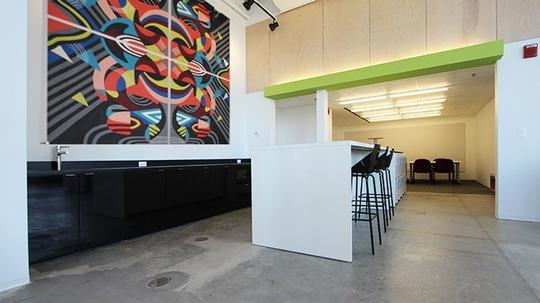

"We want companies to start and stay in Baltimore, and we want to make it affordable and easy for them to do so," said Elizabeth Smyth, director of strategic initiatives for Johns Hopkins University's technology ventures division. That's the inspiration behind Johns Hopkins' move to expand its innovation hub and launch a brand new accelerator called FastForward East.
The second incubator of its kind, FastForward East is opening its doors this week in response to huge demand for inexpensive lab space to grow the burgeoning startup scene and support young businesses as they make their way to profitability. Grand opening events kick off Tuesday, Feb. 10 with a business roundtable consisting of local economic development officials and an evening celebration followed the next day by an open house.
A catalyst for innovation and commercialization, Smyth said FastForward East isn't just for those at Johns Hopkins, but also for those with technologies derived elsewhere who want to take advantage of the programs, services and resources available.
"We want to help early ventures increase their probability of realizing their potential and bring their innovations technology to market," she explained.
Johns Hopkins opened up its first accelerator on the Homewood campus near the Whiting School of Engineering in the summer of 2013, and already there's a need for more space. The original site is at capacity with 12 companies, but with FastForward East offering up 6,000 more square feet of office and lab room in the Rangos Building, shared coworking space will be able to house 28 more young ventures with great potential.
What's especially appealing about this new accelerator is that it's an attractive, low-cost option for companies that can't afford to rent a whole lab.
"If you want to rent a lab in a retail building in Baltimore, it can cost $6,000-7,000 a month. We're offering $800 a bench a month," said Smyth. "That covers a lot of equipment like fume hoods and additionally each of our labs also include an office." Education and mentorship are also included at no additional cost. Proximity to the medical, nursing school and school of public health should come at a higher price tag, but Johns Hopkins has chosen not to take advantage of the accelerator's location, which will enable startups at FastForward East to easily have access to the areas where startups like theirs are operating.
"We feel that being located so closely to where so much of the innovation is going on at the university is critical for the interactions and the collisions among entrepreneurs that happen when you're in proximity to each other," she added.
According to Smyth, all ventures interested in joining the accelerator must fill out an application. They'll be assessed based on their value proposition. "We want to make sure we're helping the best companies who have the highest probability of success get to market," she said. Startups range the spectrum in terms of their specialities, from therapeutic to diagnostic, healthcare and IT, too.
FastForward East is only an interim solution to the longer term needs that Johns Hopkins has to address. The university plans on opening another accelerator in bio park that will be 30,000 square feet. The incubator, Smyth said, will be more than 50 percent tiered levels of lab space so that new companies can come in and use shared space and then small dedicated labs once they get funding. There will also be larger dedicated lab space that they can ultimately grow into.
"There's a lot of momentum right now coming from Dean Rothman of the medical school, President Daniels and Dean Schlesinger of the engineering school – they are all very supportive of this. They realize this isn't just good for Hopkins and Hopkins entrepreneurs, but also Baltimore and economic growth in our region," said Smyth. "The future of our city and our region depends on the organic growth we believe can come right out of the labs of the anchor institutions in this city. At Hopkins, University of Maryland, Morgan State, there's some great things going on and we feel it's important to help push this forward."




